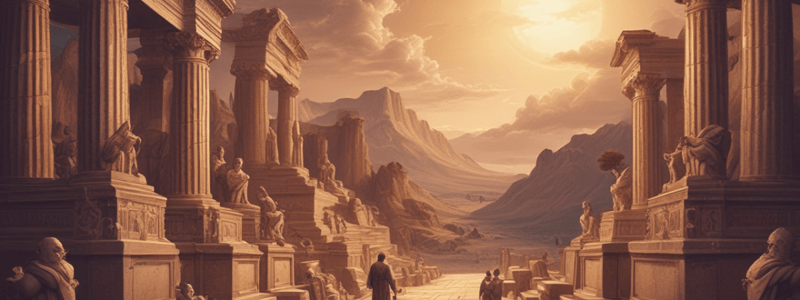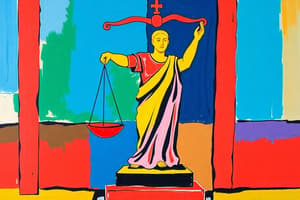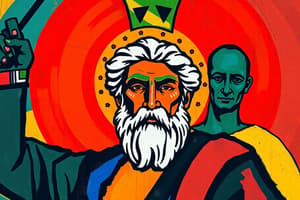Podcast
Questions and Answers
What is the primary focus of Plato's The Republic?
What is the primary focus of Plato's The Republic?
- The teachings of Aristotle
- The establishment of an imaginary city to define justice (correct)
- The education methods of The Academy
- The life of Socrates
What educational approach did Plato develop that encourages questioning traditional truths?
What educational approach did Plato develop that encourages questioning traditional truths?
- Pedagogical learning
- Experiential education
- Socratic questioning
- The dialectic method (correct)
Which of the following classes is NOT mentioned as part of Plato's imaginary city in The Republic?
Which of the following classes is NOT mentioned as part of Plato's imaginary city in The Republic?
- Guardians
- Rulers
- Producers
- Philosophers (correct)
Who were the key figures present during the discussion about justice in Book One of The Republic?
Who were the key figures present during the discussion about justice in Book One of The Republic?
What does Plato's The Republic primarily explore through its narrative?
What does Plato's The Republic primarily explore through its narrative?
What is regarded as the first book on political science according to Plato?
What is regarded as the first book on political science according to Plato?
Which class in the imaginary city of The Republic is responsible for providing goods and services?
Which class in the imaginary city of The Republic is responsible for providing goods and services?
What does Socrates suggest is necessary to define a just individual?
What does Socrates suggest is necessary to define a just individual?
What are the three categories of good as defined by Glaucon?
What are the three categories of good as defined by Glaucon?
What is Socrates' view on the education of the Guardians?
What is Socrates' view on the education of the Guardians?
Which virtue is considered the highest for the Guardians according to Socrates?
Which virtue is considered the highest for the Guardians according to Socrates?
What concept does Socrates argue regarding women in the Guardian class?
What concept does Socrates argue regarding women in the Guardian class?
What is the main teaching from the analogy of prisoners in a cave presented in Book Seven?
What is the main teaching from the analogy of prisoners in a cave presented in Book Seven?
According to Socrates, what type of ruler is necessary for a just city?
According to Socrates, what type of ruler is necessary for a just city?
Which form of government does Socrates deem the vilest?
Which form of government does Socrates deem the vilest?
Flashcards are hidden until you start studying
Study Notes
Overview of Plato's Republic
- Written by Plato, a student of Socrates, around 380 BC; foundational work in Western philosophy and political science.
- Explores the concept of justice through dialogue involving Socrates and his peers discussing the nature of justice in an imagined city.
Purpose of Writing the Republic
- Aimed to illuminate the teachings of Socrates and establish a framework for understanding justice, governance, and the ideal society.
- Utilizes the Platonic method or dialectic, which encourages questioning established norms to arrive at new insights.
Structure and Key Themes
- Introduces a tripartite class structure in the ideal city: Rulers (philosopher-kings), Guardians (protectors), and Producers (providers).
- Book One focuses on defining justice through discussions among Socrates, Glaucon, and others, questioning whether being just leads to greater happiness.
Contents of Each Book
- Book Two: Glaucon categorizes goods into three types and sets the stage for defining a just city as a reflection of individual justice.
- Book Three: Discusses the education of Guardians, emphasizing the moral and ethical training required for protecting the city.
- Book Four: Defines justice as a city without wealth disparity, governed by wise rulers and educated Guardians, emphasizing virtues of wisdom, courage, moderation, and justice.
- Book Five: Introduces radical ideas such as gender equality in the Guardian class and communal parenting for societal benefit.
- Book Six: Advocates for philosopher-kings, arguing that true philosophers are essential for just governance; counters skepticism about philosophers’ societal value.
- Book Seven: Uses the Allegory of the Cave to illustrate the transformative power of education and the journey from ignorance to knowledge.
- Book Eight: Analyzes four forms of government: tyranny (worst), oligarchy, democracy, and timocracy, highlighting their flaws and inevitability based on human nature.
- Book Nine: Examines the connection between tyranny in the soul and society, asserting that individuals control their desires and the potential for tyranny.
- Book Ten: Critiques poets and poetry for promoting falsehoods that can corrupt society; concludes with 'The Myth of Er,' emphasizing the moral value of justice and justice in the afterlife.
Philosophical Contributions
- Concepts laid out in the Republic have profoundly influenced philosophical thought regarding ethics, politics, education, and societal structures.
- Highlights the importance of wisdom and virtue in leadership and the moral responsibilities of individuals for societal justice.
Studying That Suits You
Use AI to generate personalized quizzes and flashcards to suit your learning preferences.




